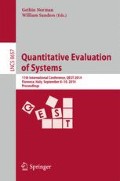Abstract
In this paper we investigate distance functions on finite state Markov processes that measure the behavioural similarity of non-bisimilar processes. We consider both probabilistic bisimilarity metrics, and trace-based distances derived from standard Lp and Kullback-Leibler distances. Two desirable continuity properties for such distances are identified. We then establish a number of results that show that these two properties are in conflict, and not simultaneously fulfilled by any of our candidate natural distance functions. An impossibility result is derived that explains to some extent the fundamental difficulty we encounter.
Access this chapter
Tax calculation will be finalised at checkout
Purchases are for personal use only
Preview
Unable to display preview. Download preview PDF.
References
Bacci, G., Bacci, G., Larsen, K.G., Mardare, R.: On-the-fly exact computation of bisimilarity distances. In: Piterman, N., Smolka, S.A. (eds.) TACAS 2013. LNCS, vol. 7795, pp. 1–15. Springer, Heidelberg (2013)
Baier, C., Clarke, E.M., Hartonas-Garmhausen, V., Kwiatkowska, M., Ryan, M.: Symbolic model checking for probabilistic processes. In: Degano, P., Gorrieri, R., Marchetti-Spaccamela, A. (eds.) ICALP 1997. LNCS, vol. 1256, pp. 430–440. Springer, Heidelberg (1997)
Chen, D., van Breugel, F., Worrell, J.: On the complexity of computing probabilistic bisimilarity. In: Birkedal, L. (ed.) FOSSACS 2012. LNCS, vol. 7213, pp. 437–451. Springer, Heidelberg (2012)
Cortes, C., Mohri, M., Rastogi, A., Riley, M.: On the computation of the relative entropy of probabilistic automata. Int. J. Found. Comput. Sci. 19(1), 219–242 (2008)
Desharnais, J., Gupta, V., Jagadeesan, R., Panangaden, P.: Metrics for labeled Markov systems. In: Baeten, J.C.M., Mauw, S. (eds.) CONCUR 1999. LNCS, vol. 1664, pp. 258–273. Springer, Heidelberg (1999)
Do, M.N.: Fast approximation of Kullback-Leibler distance for dependence trees and hidden Markov models. IEEE Signal Processing Letters 10(4), 115–118 (2003)
Gray, R.M.: Entropy and Information Theory, 2nd edn. Springer (2011)
Kullback, S.: Information Theory and Statistics. Wiley (1959)
Larsen, K.G., Skou, A.: Bisimulation through probabilistic testing. Inf. Comput. 94(1), 1–28 (1991)
Mao, H., Chen, Y., Jaeger, M., Nielsen, T.D., Larsen, K.G., Nielsen, B.: Learning probabilistic automata for model checking. In: Proceedings of the 8th International Conference on Quantitative Evaluation of SysTems (QEST), pp. 111–120 (2011)
Rached, Z., Alajaji, F., Campbell, L.L.: The Kullback-Leibler divergence rate between Markov sources. IEEE Transactions on Information Theory 50(5), 917–921 (2004)
Sen, K., Viswanathan, M., Agha, G.: Learning continuous time Markov chains from sample executions. In: Proceedings of International Conference on Quantitative Evaluation of Systems (QEST), pp. 146–155 (2004)
Shields, P.C.: Two divergence-rate counterexamples. Journal of Theoretical Probability 6(3), 521–545 (1993)
Silva, J., Narayanan, S.: Upper bound Kullback-Leibler divergence for transient hidden Markov models. IEEE Transactions on Signal Processing 56(9), 4176–4188 (2008)
Thomas, W.: Automata on infinite objects. In: van Leeuwen, J. (ed.) Handbook of Theoretical Computer Science, vol. 2. Elsevier/MIT Press (1990)
Toussaint, G.T.: Sharper lower bounds for discrimination information in terms of variation (corresp.). IEEE Transactions on Information Theory 21(1), 99–100 (1975)
van Breugel, F., Sharma, B., Worrell, J.: Approximating a behavioural pseudometric without discount for probabilistic systems. Logical Methods in Computer Science 4(2), 1–23 (2008)
van Breugel, F., Worrell, J.: A behavioural pseudometric for probabilistic transition systems. Theoretical Computer Science 331, 115–142 (2005)
Author information
Authors and Affiliations
Editor information
Editors and Affiliations
Rights and permissions
Copyright information
© 2014 Springer International Publishing Switzerland
About this paper
Cite this paper
Jaeger, M., Mao, H., Guldstrand Larsen, K., Mardare, R. (2014). Continuity Properties of Distances for Markov Processes. In: Norman, G., Sanders, W. (eds) Quantitative Evaluation of Systems. QEST 2014. Lecture Notes in Computer Science, vol 8657. Springer, Cham. https://doi.org/10.1007/978-3-319-10696-0_24
Download citation
DOI: https://doi.org/10.1007/978-3-319-10696-0_24
Publisher Name: Springer, Cham
Print ISBN: 978-3-319-10695-3
Online ISBN: 978-3-319-10696-0
eBook Packages: Computer ScienceComputer Science (R0)

